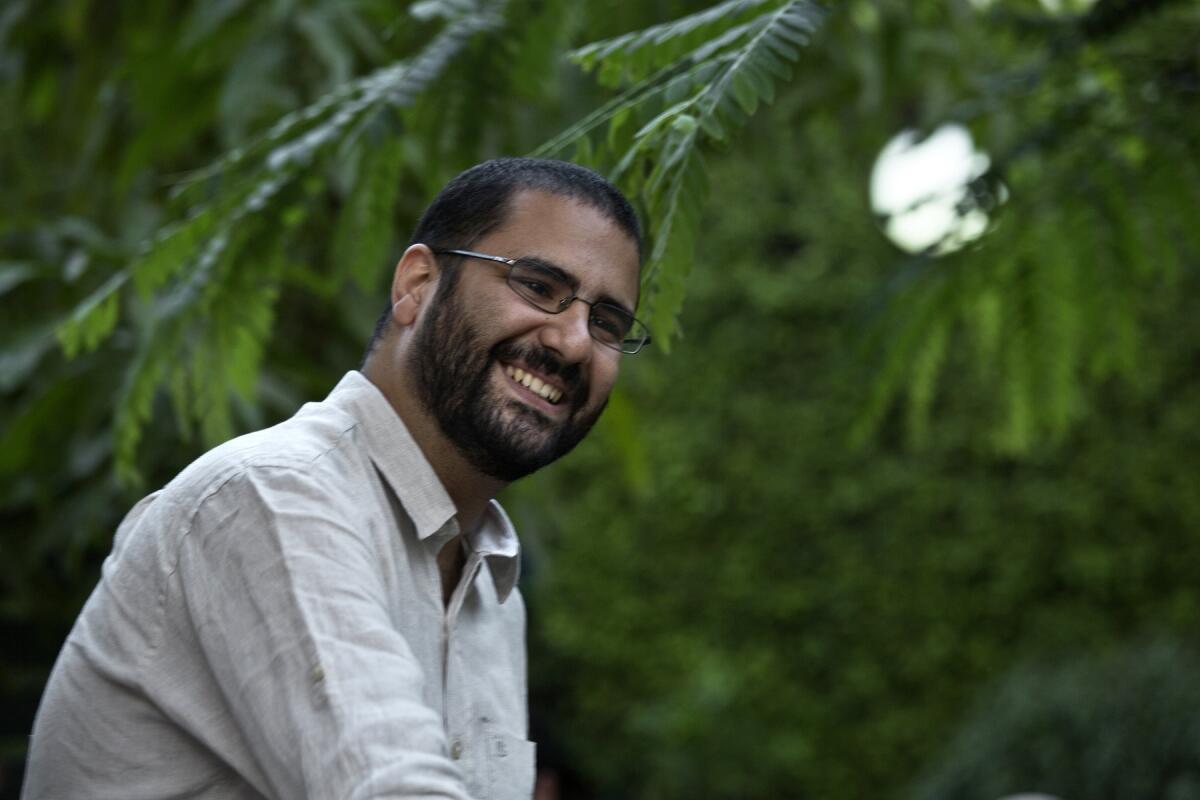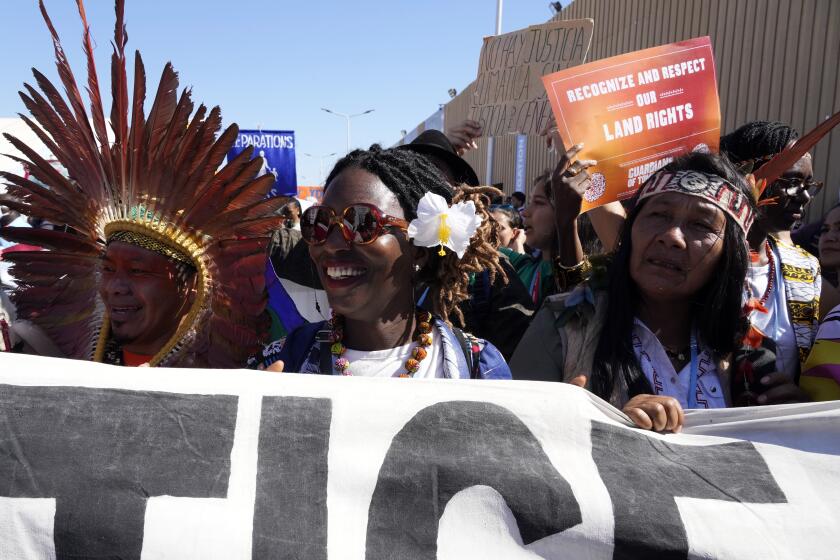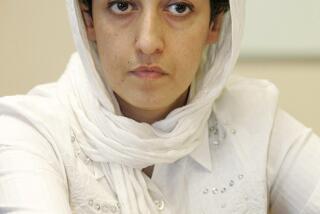Imprisoned Egyptian pro-democracy activist calls off hunger strike

- Share via
CAIRO — The family of imprisoned Egyptian pro-democracy activist Alaa Abdel-Fattah said Tuesday they received a letter from him stating that he has ended his hunger strike.
In a statement, the family said that Abdel-Fattah’s mother, Laila Soueif, received a short note in her son’s handwriting via prison authorities. The letter is dated Monday. In it, he asks her to come for her monthly visit to him in prison Thursday.
‘‘I’ve broken my strike. I’ll explain everything on Thursday,’’ the letter read. The circumstances under which he wrote the letter were not clear. The activist had previously said he was willing to die from his strike if he was not freed.
The family has not seen Abdel-Fattah since the last allotted visit a month ago and has not been given information on his condition. In the note, Abdel-Fattah asks his mother to bring a cake to celebrate his 41st birthday, which is Friday. The meetings, conducted behind a glass barrier, usually last for around 20 minutes.
“From the letter, it is clear that his psychological state “is good,” Soueif told the Associated Press. “But I won’t be reassured until I see him.”
Fears had been mounting over Abdel-Fattah’s life since he stopped intake of all food, then stopped drinking water Nov. 6, escalating a months-long partial hunger strike to raise the pressure for his release. His strike was timed to coincide with Egypt’s hosting of the international climate summit to draw attention to his case and those of other political prisoners. His partial hunger strike began April 2, after which he consumed only 100 calories a day.
As more nations veer toward authoritarianism, political elites should recall how the Arab Spring ended when distrust turned to hatred of the opposition.
The news comes a day after the renowned dissident announced the end of his water strike Monday via a similar handwritten letter delivered to the family.
The prison authorities began a medical intervention on Abdel-Fattah on Thursday, but authorities did not provide details of the nature of the intervention, raising concerns among the family that he was being force-fed.
“I feel cautiously relieved now knowing that at least he’s not on hunger strike, but my heart won’t really be settled until Thursday,’’ his sister Mona Seif said in the family’s statement.
Abdel-Fattah is one of Egypt’s most prominent pro-democracy activists and has spent most of the last decade in prison. He is currently serving a five-year sentence on charges related to sharing a Facebook post.
Activists called on industrialized nations to pay for the impact of climate change and to speed up the transition from fossil fuels to renewable energy.
He rose to prominence during the 2011 pro-democracy uprisings — known as the Arab Spring — that swept through the Middle East. In Egypt, the uprising toppled the country’s longtime autocratic President Hosni Mubarak.
Abdel-Fattah’s hunger strike has drawn attention to Egypt’s heavy suppression of speech and political activity. Since 2013, Egyptian President Abdel-Fattah Sisi’s government has cracked down hard on dissidents and critics, jailing thousands and virtually banning all protests.
During the two-week climate conference, President Biden, British Prime Minister Rishi Sunak, French President Emmanuel Macron and German Chancellor Olaf Scholz all raised the activist’s case in their private talks with Sisi. Abdel-Fattah gained British citizenship earlier this year through his mother, who was born in London. The family has frequently criticized the British government for not doing enough to secure his release.
At the conference, Egypt’s foreign minister, Sameh Shoukry, played down the global attention surrounding Abdel-Fattah’s deteriorating health. Shoukry, the president of the conference, said Saturday that the priority of the summit should be focused on “the existential challenge related to climate change.’’
Start your day right
Sign up for Essential California for the L.A. Times biggest news, features and recommendations in your inbox six days a week.
You may occasionally receive promotional content from the Los Angeles Times.
A number of human rights groups have accused Egypt of using the global gathering in Sharm el-Sheikh to whitewash its poor rights record. Egypt is among the world’s biggest jailers of journalists, along with Turkey and China, according to 2021 data produced by the U.S.-based Committee to Protect Journalists. Human Rights Watch estimated in 2019 that as many as 60,000 political prisoners are incarcerated in Egyptian prisons.
On Saturday, Sanaa Seif, another of Abdel-Fattah’s sisters, took part in a protest march in Sharm el-Sheikh that saw hundreds of activists demand action on climate change, human and gender rights. The protesters called for the release of Abdel-Fattah and all political prisoners detained in Egypt.
Sanaa Seif, who has been imprisoned in Egypt before and now lives in London, flew to the conference to raise awareness about her brother’s case.
‘‘We’re counting down the days until Thursday,’’ said Sanaa, in the family’s statement published Tuesday.
More to Read
Sign up for Essential California
The most important California stories and recommendations in your inbox every morning.
You may occasionally receive promotional content from the Los Angeles Times.















